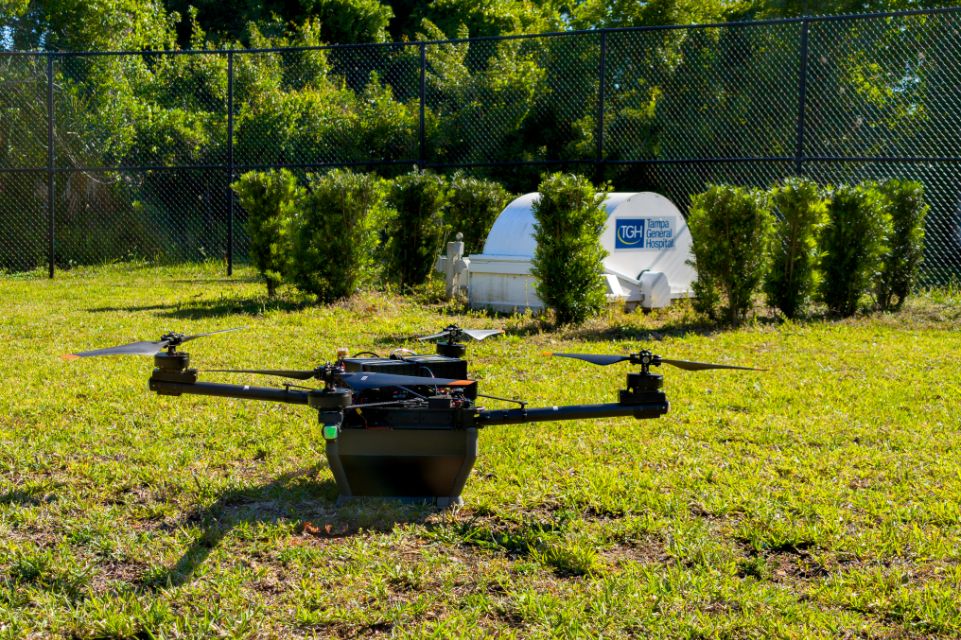Tampa General Hospital, Manatee County and ArcherFRS Introduce First-In-The-Nation Program to Deliver Life-Saving Emergency Response Equipment Via Drone Delivery
Published: Apr 23, 2024
FAA-approved drone technology will accelerate response to 9-1-1 callers in Manatee County coverage area.
Tampa, FL (April 23, 2024) - As part of Tampa General Hospital’s (TGH) commitment to transforming health care through innovation, the academic health system collaborated with Manatee County and Archer First Response Systems (ArcherFRS) to accelerate response times to health-related emergencies with drone delivery. The 9-1-1 integrated drone delivery system sponsored by Tampa General will provide life-saving equipment to eligible 9-1-1 callers in Manatee County coverage area beginning May 1.
“Through the use of technology and innovation, Tampa General Hospital is transforming health care,” said John Couris, president and CEO of TGH. “This first-in-the-nation program can effectively save lives by responding to health-related emergencies faster than ever before. We’re grateful to our partners in Manatee County, and we’re excited to see this vision come to life. With the ability to measure the impact of this program on the community, we can determine how the technology can be used in more scalable, reproducible ways for the broader benefit of our state.”
This program marks the first-in-the-nation use of drone technology to support emergency response efforts with the delivery of a payload carrying an automated external defibrillator (AED), NARCAN Nasal Spray and a tourniquet. With rapid access to lifesaving equipment, individuals benefit from increased chance of survival and better health outcomes.
"ArcherFRS is committed to ushering in the next generation of life-saving emergency response. Sudden cardiac arrest, opioid overdose and trauma impact hundreds of thousands of people in the United States each year; there is a real need for a paradigm shift in the treatment and response to these time-critical emergencies," said Gordon Folkes, founder and chief executive officer of ArcherFRS. “Unmanned aircraft provide a unique utility in their ability to fly quickly and directly to the scene of an emergency and pose exceptional promise to decrease response times, save lives and improve outcomes. We are excited, together with Manatee County Public Safety and Tampa General Hospital, to redefine what is possible and raise the bar when it comes to cardiac arrest, overdose and trauma response.”
ArcherFRS utilizes Freefly Systems AltaX unmanned aircraft equipped with an ASTM-certified Parachute Recovery system, ADS-B receiver, on-board computer and LTE cell modem. The system is installed at the Manatee County EMS Lakewood Ranch Station on Malachite Drive and will serve a 3.5 square mile area of coverage Monday through Friday during daylight hours. The goal is to expand coverage area to 35 square miles, 24-hours-per-day, 7-days-per-week with additional approvals from the Federal Aviation Administration (FAA).
Tampa General and Archer FRS briefed the Manatee County Commission on the status of the program at a public meeting today, where local leaders expressed overwhelming support for the innovative program. Public notices will be mailed this week to area residents informing them of the drone delivery system.
“This is an amazing opportunity to be on the cutting edge of technology in emergency response,” said Manatee County Board of County Commissioners Chair Mike Rahn. “We are excited that this first-of-its-kind program is taking flight first here in Manatee County.”
Beginning May 1, when an individual in the coverage area calls 9-1-1 with reports of cardiac arrest, opioid overdose or trauma, the Manatee County ECC Dispatch will initiate deployment of the ArcherFRS drone. The equipment is expected to reach the caller between 1 minute 45 seconds and 2 minutes 10 seconds. Dispatch will walk the 9-1-1 caller through the application of the equipment needed while traditional emergency response vehicles are en route.
Over the next 12 months, TGH, ArcherFRS and Manatee County will evaluate the performance and effectiveness of the program to determine how the technology can be utilized to serve more residents across the state.
AEDs are used to respond to individuals experiencing sudden cardiac arrest. Each year, 350,000 people in the United States experience a cardiac arrest outside the hospital and only 10% survive. NARCAN Nasal Spray can prevent death in the event of overexposure to opioids. Last year, more than 112,000 Americans died from opioid-related exposure. The tourniquet is used to apply pressure and stop blood loss for individuals with trauma-related injuries. Each payload delivered by the drone includes one AED and one dose of NARCAN Nasal Spray. In the coming weeks, the payload will be expanded to include one tourniquet. Rapid delivery of this life-saving equipment can significantly improve patient outcomes. Any 9-1-1 caller in the coverage area that utilizes the equipment will benefit from the drone delivery at no cost to them.
“Our team has diligently worked with the FAA to ensure strict adherence to safety standards for the deployment of life-saving equipment via drones within the Manatee County community,” said Jason Swoboda, director of innovation at Tampa General Hospital. “Over the past several years, we have engaged with the FAA to align both the drone technology and the operational protocols with the FAA’s rigorous requirements. Our commitment remains in prioritizing the safety and reliability of the program.”
Manatee County residents seeking more information on the program can visit https://www.mymanatee.org/drone.
